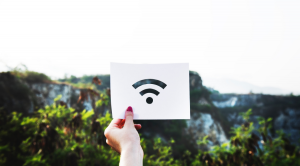What is a VPN and why you (REALLY) need it in 2023
A virtual private network (VPN) is a convenient application designed to enhance users' online security and privacy. By transmitting online activity through its own servers and encrypting information in transit, a VPN helps hide potentially personal data such as location, browsing history and browser type. browser in use.
However, not just for security and privacy purposes, VPNs are also widely used to bypass geo-restrictions in accessing content. For example, routing data through a VPN server in the US can open up the ability to access apps and services that only exist there (like Hulu), even if the user is in another country.
For people living in countries with strong internet restrictions, VPNs become an indispensable tool to access blocked websites like Google or Facebook, helping them mask their actual location and keep personal information protected.
Why do I need a VPN?
The Internet today is full of worrying risks, threatening each person's online privacy and security. In general, malicious parties can collect your personal data, monitor your online activities, and even intercept your connection. In addition, some networks impose restrictions by blocking access to specific websites, significantly reducing online freedom.
A VPN becomes an important investment if you are particularly concerned about your privacy and online safety. Considered an effective solution, VPN not only ensures safety against privacy invasions but also provides access to blocked websites. Furthermore, it encrypts your connection, preventing Google, Facebook or your Internet service provider from tracking your every online activity. Therefore, these are the important reasons why using a VPN becomes necessary.
VPN encrypts all your data
A VPN works by encrypting your connection when connecting to its private servers. This process scrambles your data, making information about your online behavior and activities unreadable to anyone outside. Using military-grade encryption, most VPNs ensure that no one can track what you are doing on the internet.
This means that no one can observe your browsing activity or intercept your connection, not even your Internet service provider (ISP), because everything is just a series of random numbers. natural to them. Not only does this prevent your ISP from throttling your speeds when you engage in bandwidth-intensive activities, like gaming, but it also becomes critical on public WiFi networks. On these networks, VPNs become an essential layer of protection, protecting your traffic from hackers, preventing them from collecting information like passwords or credit card numbers.
Most VPN services use 256-bit AES encryption, considered the strongest level of encryption available today. The number 256 represents the length of the encryption key, and the longer each bit, the more time-consuming the decryption process becomes. With this level of security, VPNs not only meet government requirements but are also used by leading security agencies to protect sensitive information.
VPN hides your actual location
Your real IP address may be visible without a VPN, meaning unwanted parties could use it to determine your real location. (An IP address is like your phone number, but for your internet connection.) This is dangerous when combined with other personal data because you are easily identified, leaving you vulnerable to attacks online. Intrusive parties such as advertisers can also use this information to target advertising at you, while your ISP can store and transfer that information without your knowledge.
VPNs have other benefits
Some VPNs offer the ability to block ads and prevent malicious websites from infiltrating and infecting malware as well as trackers that can track your activities on your device. These features are usually available in VPN settings and help you experience sites like YouTube without being plagued by annoying ads. At the same time, they protect you from the threat of hackers and other forms of tracking, which is especially useful when you're torrenting.
Another advantage of using a VPN is the ability to bypass geo-blocks on sites like Netflix. The content you can access on these platforms often depends on your IP address, and changing it via VPN can open the door to a variety of different content. This becomes especially useful when you are abroad and want to watch shows from your home country.
VPNs also provide access to global gaming servers and bypass geo-restrictions on games. This enhances your gaming experience by allowing you to participate in matches against diverse opponents and receive different game packs and rewards that may not be available in your region.
Strict no-logs policy
Choosing a reliable VPN is an important step in protecting your online privacy, as it has a direct impact on full access to your online activity. The most important privacy feature of a VPN is its strict no-logs policy, which helps ensure that the service doesn't track or collect your personal data. This means no information will be turned over if there is a request from a government agency during an investigation or if the VPN's servers are hacked.
Protection against leaks
There's always a chance that a VPN could accidentally leak your DNS requests and IP address because security vulnerabilities can happen with any software. IP/DNS leaks defeat the purpose of using a VPN because this is the information it is supposed to hide. The most secure VPNs have built-in leak protection to prevent any DNS/IP leaks from occurring.
To test your DNS/IP leak protection, go to a website such as ipleak.net after connecting to a server. Then, wait a few seconds until it displays the IP address your device is connected to. As long as it only shows you the VPN's IP, it means you're fully protected.
A VPN can help you hide information from websites so you stay protected. We recommend Rice VPN, our service has advanced security and encryption features that will help protect your network security.










